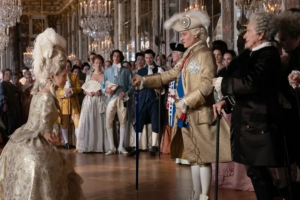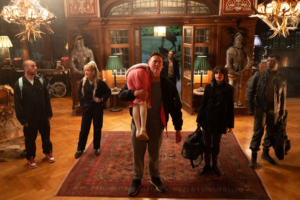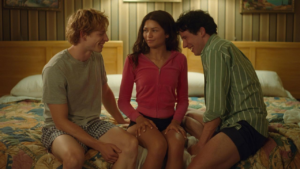Reviewed by GREG KING
Director: Abdellatif Kechiche
Stars: Lea Seydoux, Adele Exarchopoulos.
Love and pain and the whole damn thing French style?
This confronting romantic drama was the talk of Cannes last year, largely because of its unflinchingly explicit girl on girl sex scenes that leave little to the imagination. In this regard, Blue Is The Warmest Colour is very French in its approach to sexuality, sex and relationships, although it is not quite as confronting as Catherine Breillat’s oeuvre.
This is essentially a coming of age story as it follows the sexual awakening and blossoming of the virginal, sexually naive high school girl Adele (played with a rawness and vibrant sensuality by the largely unknown Adele Exarchopoulos) who finds herself attracted to the older Emma (Lea Seydoux, from Inglorious Basterds, Farewell, My Queen, etc), a free spirited avante garde artist she meets in a gay nightclub. Emma’s streak of bright blue hair stamps her as an individual, and she arouses Adele’s curiosity. The film follows Adele’s painful journey of self-discovery as she grows from naive student to a preschool teacher.
It also charts their relationship through the emotional tug of first love, its highs and lows, the betrayal of infidelity, and the eventual painful breakup. But the film is also an exploration of the pains of first love, longing and loss, youthful rebellion and ambition, student protests, the search for meaning, love and life in contemporary France, regret and disappointment, as much as it is a powerful drama exploring the relationship between two women.
The film is based on Julie Maroh’s explicit graphic novel Blue Angel. It has been co-written and directed by Tunisian filmmaker Abdellatif Kechiche, who previously gave us the rather dull The Secret Of The Grain a few years ago. His latest film features many of his signature touches, in particular the use of extreme closeups that give us intimate glimpses into the conflicting emotions that play out across the faces of the characters.
The film clocks in at just under three hours, and its inordinate length and intelligent analysis of food, literature and art will test the patience of many within the audience. Some scenes are stretched out too long – there’s a torrid and very explicit ten-minute sex scene in the middle of the film that, like the climactic belly dance sequence from The Secret Of The Grain seems painfully long – and there are many small scenes that hint at unnecessary padding.
The film spans some ten years, but Kechiche deftly skips ahead in time with little more than a quick and subtle edit. And the film ends abruptly, leaving audiences to put their own spin on what they think will happen next. The original French title is La Vie d’Adele – Chapitres 1 & 2.
Newcomer Exarchopoulos is virtually on screen the whole time, and she gives a strong performance as Adele, who never quite feels comfortable with her situation. Exarchopoulos and Seydoux establish a genuine chemistry and there is a rawness, fearlessness and astonishing intimacy to their scenes together. Apparently, many of their exchanges were improvised around the loose structure given them by director Kechiche, giving their performances a natural and unforced feel. But apparently it was not all hugs and kisses between the pair, as there was a very public spat and falling out between them after they shared the top prize at Cannes.
However, the voyeuristic quality of the sex scenes largely undermines the integrity of the emotional connection we are supposed to form with the two protagonists and we feel a little dirty and ashamed after spying on some of the most intimate moments of their relationship. As with The Secret Of The Grain, the film overstays its welcome; Kechiche needs to be told when to stop the camera before it becomes too much and a sense of boredom kicks in.
★★




